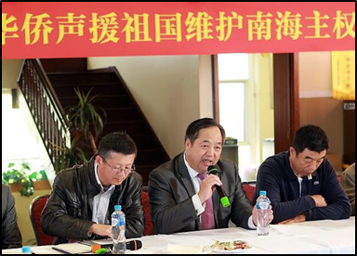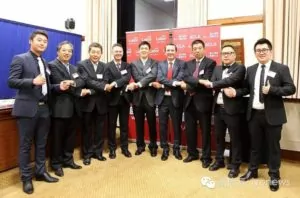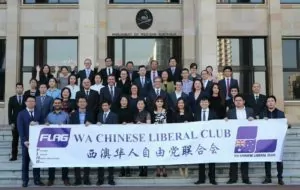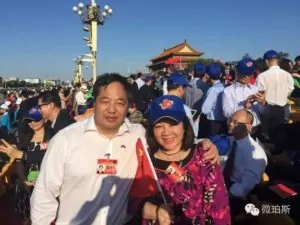
How Beijing is Shaping Politics in Western Australia
Publication: China Brief Volume: 19 Issue: 9
By:

Introduction—The United Front and “Mixing Sand” in Australia
Political organizations with links to the Chinese Communist Party (CCP) are active inside Australia’s two main political parties and using their growing influence to promote Beijing’s interests. Unlike Russia, which the U.S. intelligence community has concluded carried out an ambitious campaign of interference intended to benefit Donald Trump in the 2016 U.S. presidential election (U.S. Director of National Intelligence, January 2017), the CCP is bipartisan in its activities in Australia: it aims to build influence across the political spectrum, and to sway whomever wins. Although the activities of real estate mogul Huang Xiangmo have attracted the greatest attention (ABC News (Australia), April 6, 2019), Huang represents only part of a much larger effort on the part of People’s Republic of China (PRC)-affiliated “united front” organizations to influence politics in Australia and beyond.
Beijing is exploiting multiculturalism as a cover for its policy of “Chinese participation in politics” (huaren canzheng, 华人参政) (People’s Daily Overseas Edition, July 31, 2018; The Daily Beast, July 18, 2018). Organizations working on behalf of the Chinese government are following the advice laid out in 2010 by a CCP strategist for maximizing political influence in Western democracies: build ethnic Chinese-based political organizations, make political donations, support ethnic Chinese politicians, and deploy votes to swing close-run elections (Jinan University United Front Department, May 5, 2010). James To, a New Zealand academic, has gained access to a trove of documents in Beijing—one of which, dated 2004, described cultivating ethnic Chinese in countries like Australia to vote as a bloc, join parties, and stand for public office. [1] This approach is related to the “mixing sand” (chan shazi, 掺沙子) tactic advocated by Mao Zedong: plant trusted people in the enemy’s ranks in order to weaken them (People’s Daily, October 29, 2013).
Many of the persons and organizations prominent in Australia’s huaren canzheng movement have identifiable linkages with the influence network of the CCP’s United Front Work Department (UFWD) or other Chinese government agencies. The UFWD is a powerful branch of the CCP tasked with influencing and controlling groups outside the party, including groups located abroad. [2] Chinese President Xi Jinping has famously described united front work as a “magic weapon” of the CCP, and he has overseen a dramatic increase in personnel and resources for the UFWD (China Brief, April 24, 2018; Australian Centre on China in the World, 2018). UFWD organizations appear to be grooming a new generation of young Chinese-Australians for entry into politics, either through mentoring or “educational seminars.” [3] Candidates recruited and supported by such organizations will be expected to put ethnic Chinese voters’ interests first (Western Australia Chinese Liberal Club, September 10, 2017). Huang Xiangmo has written of the need to nurture those with bilingual skills “who can walk through the revolving door of politics, business and academia at ease” (Australian CPPRC, July 2015).
Efforts by Chinese-Australians, as well as citizens from other underrepresented ethnic groups, to further engage in politics should be welcomed. However, Australia and other democratic societies must also recognize when organizations, and persons affiliated with them, are susceptible to influence from authoritarian foreign governments. This is particularly true when these groups are dominated by members with close links to the CCP, and are in a position to influence policymakers and other leaders to adopt positions favored by Beijing.
Up to the present, New South Wales (NSW) has been seen as the epicenter of CCP influence in Australia: for example, some of those associated with Chinese Friends of Labor in NSW are now the focus of an Independent Commission Against Corruption investigation for allegedly concealing the sources of political donations (ABC News (Australia), February 3). However, NSW is not unique, and pro-Beijing influence activities are especially well-organized in Western Australia (WA). These activities have met with little scrutiny and resistance in WA in part because pro-Beijing lobbyists have powerful friends in the business community, in politics, and in the media. In public and behind closed doors, these lobbyists attack CCP critics as “anti-Chinese,” and pressure political leaders to be “friends of China”—meaning, in this context, to support policies that favor the Chinese government.
“The Australian Chinese Labor Association” and the United Front

The Australian Chinese Labor Association (ACLA) was established in Perth in 2015. Its founder was Pierre Yang (Yang Shuai), a Chinese-Australian who is now the Labor Party chief whip in the upper house of the Western Australia state parliament. Tellingly, the formation of the ACLA was announced on the website of the central UFWD in China (UFWD, March 16, 2015; Xinhua, March 16, 2015). Pierre Yang is reported to have recruited 500 new members to the WA Labor Party, substantially boosting the party’s membership of 7,000 as well as Yang’s own clout in the party (The Australian, December 5, 2018).
Pierre Yang has had a charmed run through the ranks of the Australian Labor Party (ALP), bypassing the rank and file with the backing of powerful figures from the WA union movement (Australian Chinese Times, August 22, 2013; ABC News (Australia), March 18, 2016). Yang has said that he entered politics to counter Australia’s lamentable history of anti-Chinese racism. He has also said that the social status of Chinese Australians is “inseparable from the development of the motherland,” and an article in a pro-Beijing Perth newspaper wrote of him: “Hot Chinese blood courses through the veins of this refined and cultured-looking handsome man” (Australian Chinese Times, August 22, 2013). Following recent media exposure of his ties to UFWD-affiliated groups (The Australian, December 3, 2018) Yang has stated that he resigned from his various positions with those organizations (The West Australian, January 2).
Pierre Yang’s mentor is Edward Zhang (Zhang Ye), whom Yang describes as “like an uncle to me” (Pierre Yang Inaugural Speech, May 25, 2017). According to his own newspaper, Edward Zhang is an advisor to the Australian Chinese Labor Association (Australian Chinese Times, March 26, 2015). Zhang is chief editor of the pro-PRC Chinese-language newspaper Australian Chinese Times, and a leading figure in Western Australia’s Chinese community. Last December, 600 people turned up to a gala to celebrate the 20th anniversary of his newspaper, with both the Western Australia premier and the opposition leader attending (The Australian, December 13, 2018). As a further measure of his influence, Zhang has been appointed by the McGowan government to the Ethnic Communities Council of WA (Western Australia Chinese Chamber of Commerce, June 27, 2018).
Zhang has been linked to five Perth-based organizations affiliated with the UFWD (The Australian, December 13, 2018), including the Northeast China Federation and the Association of Great China. Most prominently, he is the honorary chairman of the WA branch of the Australian Council for the Promotion of the Peaceful Reunification of China (ACPPRC). The CPPRC is the most prominent international front organization of the UFWD, with chapters located worldwide (China Brief, February 13, 2018; China Brief, May 8). The Australian national chapter is based in Sydney, and was headed until recently by Chinese billionaire Huang Xiangmo (The Australian, December 13, 2018), whose Australian permanent residency has been revoked due to alleged involvement in political interference efforts on behalf of the PRC (Sydney Morning Herald, February 5).
Ben Pan (Pan Bangzhao) was another supporter present on the founding day of the ACLA. He’s also the President of the Western Australia branch of the ACPPRC, and executive vice president of the national body (Western Australia CPPRC, undated; Australian CPPRC, undated). Apart from Huang Xiangmo, Ben Pan is the only person from Australia known to have held an executive title with the parent body in China (Guizhou Province CPPRC, May 9, 2014). Under the leadership of Pan, the WA branch of ACPPRC has sought to mobilize Perth’s Chinese diaspora for demonstrations in support of Beijing’s positions: it has organized protest rallies against the visit of Japanese Prime Minister Shinzo Abe, the free Tibet movement, and the inauguration of Taiwan president Tsai Ing-wen (Western Australia CPPRC, July 11, 2014; Western Australia CPPRC, June 14, 2015, Western Australia CPPRC, May 27, 2016). The organization has even gone so far as to organize a “singing red songs in Western Australia” (hong ge chang xiang Xi Ao, 红歌唱响西澳) concert in praise of the Chinese Communist Party (People’s Daily, June 27, 2011).
Pan is also one of the founders and the honorary president of the Western Australia Fujian Association (WAFA), perhaps the most powerful “hometown association” in Western Australia (Western Australia Fujian Association, undated; Iyo News, March 23, 2015; Twitter, December 4, 2018). The current president is Tom Wang (Wang Qunhua) whose company donated $33,000 to the ALP in 2014 (Western Australia Fujian Association), part of a $260,000 donation to the party organized by media tycoon Tommy Jiang, who has been described as the operator of “one of Australia’s largest pro-Beijing media organisations” (Australian Broadcasting Corporation, April 5, 2019) and as “Beijing’s chief propagandist in Australia” (Sydney Morning Herald, December 15, 2017).
“The Western Australia Chinese Liberal Club” and the United Front

The WA Chinese Liberal Club was launched in 2017 (WAMN News, November 8, 2017; Western Australia Chinese Liberal Club, August 3, 2017). The club’s first president is Lily Chen, who was elected as a Liberal candidate to the Perth City Council in 2011, and re-elected in 2015 (Migrate & Study; ABC News (Australia), March 21, 2017). Chen is well-connected to Perth’s united front network. On May 6, 2011 she attended a meeting convened by the PRC Consul General in Perth to discuss the formation of a WA branch of the ACPPRC (Xinhai Revolution, May 8, 2011). This led to Chen, along with Labor’s Ben Pan, Edward Zhang and others, founding the WA branch of the ACPPRC in May 2011. To officiate at the inaugural meeting, they invited senior officials from the PRC as well as William Chiu, the then-chairman of the ACPPRC from Sydney headquarters (Xinhai Revolution, May 18, 2011). When Chiu died in 2015, the People’s Daily hailed him as “a great China patriot,” and he was buried in a Beijing cemetery reserved for revolutionary heroes. [4]
In September 2012, Chen acted as a media liaison for a protest rally organized by the WA branch of ACPPRC that aimed to “resolutely support China in defending her sovereignty [over] the Diaoyu Islands and [the] affiliated islands.” [5] Two years later, she attended a dinner party hosted by Ben Pan to welcome a Communist Party delegation from Beijing. In his speech on this occasion, Pan praised PRC President Xi Jinping’s “Chinese Dream,” saying that “we work for the development of China as well as to make contributions to Australia” (Western Australia CPPRC, June 11, 2014). In September 2015, Lily Chen joined four other Perth Chinese community leaders—including Ben Pan—to attend a massive military parade in Beijing to commemorate the 70th anniversary of victory in the War of Resistance Against Japan. They were seated in an area reserved for special guests (see accompanying photo).

In addition to Lily Chen, another figure prominent in the WA Chinese Liberal Club is Ding Shaoping, who moves between both the Liberal and Labor parties as a lobbyist and organizer. His links with the WA Chinese Liberal Club were apparent last October when the Liberal member for Canning, Andrew Hastie, addressed the club in Perth. (Notably, Hastie spoke about the need for the new foreign interference and transparency laws, and the associated safeguards intended to protect the rights of Chinese-Australians.) Ding was in attendance at the event, along with Lily Chen and the former PLA officer John Jiang (Facebook, October 3, 2018).
Ding was a founding member and honorary president of the powerful WA Fujian Association, whose senior members also include Labor’s Ben Pan and Labor donor Tom Wang (Western Australia Fujian Association; Western Australia Fujian Association). Additionally, the Chung Wah Association (CWA), Western Australia’s oldest community organization, was taken over by Ding’s management team (Australian Chinese Times, August 29, 2015), an event that occurred under murky circumstances. [6] Ding was later appointed as a director of a PRC-based committee of the China Association for International Cultural Exchanges with Overseas Chinese, another organization under the United Front umbrella (All-China Federation of Returned Overseas Chinese, September 13, 2016).
Under the leadership of Ding Shaoping, the CWA has become an active propaganda outlet for the PRC, issuing statements of support for Beijing’s policies on issues such as the South China Sea. In July 2016, the WA branch of the ACPPRC convened a joint forum with the CWA, which issued a declaration “resolutely” defending China’s occupation of islands in the South China Sea (ACPPRC, July 10, 2016): “The over 150,000 Chinese people in West Australia… are sons and daughters of ethnic Chinese who have an unshakable duty to defend our motherland’s security and dignity.” The resolution further called on the Australian government to support “the Chinese people and Australian Chinese people’s… tireless efforts in defending Chinese sovereignty in the South China Sea.” The forum itself saw an outpouring of Chinese nationalist sentiment. Ding Shaoping informed those present that “if someone is hatching a sinister plot, we will do our utmost to support the motherland in her fight for justice.” Edward Zhang declared that “We overseas Chinese are the first line of defense for our motherland” (Australian Chinese Times, July 11, 2016).
Conclusions
The PRC’s united front tactics have real consequences: for example, the influence of pro-PRC lobby groups on WA government decisions was apparent last year, when the McGowan administration ignored warnings from Canberra about the security risks posed by awarding a contract to Huawei for installation and maintenance of the communications network for Perth’s rail system (ABC News (Australia), July 9, 2018; The Australian, December 11, 2018). This occurred even though the federal government has banned the Chinese telecom equipment-maker from the nation’s 5G network, and other nations are following suit.
Australian voters may wonder why leaders of both the Labor and Liberal Parties in Western Australia openly endorse organizations that seem to be dominated by leaders who have pledged allegiance to a foreign government, and that have advocated positions that contradict their parties’ policies on regional security issues. The concerns raised here go far beyond sincere disagreements over matters of public policy: instead, the examples presented in this article provide further evidence of a large-scale effort, directed by agencies of the Chinese government, to shape Australian public opinion and government policies in directions conducive to the interests of the PRC.
Chinese-Australians are under-represented in Australian politics, and greater participation by citizens of Chinese heritage should be encouraged. However, individuals joining parties or running for office in order to promote covertly the political agenda of a foreign power ought to have their associations exposed. The influence activities occurring in Western Australia are also occurring in other states of Australia. Whether Australia’s new laws relating to foreign interference, and other measures intended to defend civil society and the integrity of government, will prove to be effective remains to be seen.
Wai Ling Yeung is a former head of Chinese Studies at Curtin University. Clive Hamilton is professor of public ethics at Charles Sturt University in Canberra and author of Silent Invasion: China’s Influence in Australia.
Notes
[1] James Jiann Hua To, Hand-in-Hand, Heart-to-Heart (PhD thesis, University of Canterbury, 2009), pp. 40-41.
[2] Clive Hamilton and Alex Joske, Submission to the Parliamentary Joint Committee on Intelligence and Security, Inquiry into the National Security Legislation Amendment (Espionage and Foreign Interference), Bill 2017.
[3] For example, on May 23, 2015, the Youth Committee of ACPPRC organised a huaren canzhen “educational seminar” (Zhongguo Qiao Wang, May 26, 2015). James Zhou, vice president of ACPPRC, later that year wrote of the “creative and visionary program that provides an express channel to inspire, scout for, nurture and recommend elite young Chinese-Australians to participate in politics” (ACPPRC, March 2017).
[4] Clive Hamilton, Silent Invasion (Melbourne: Hardie Grant Books, 2018), pp. 30-31.
[5] In the course of Ms. Chen’s 2015 election campaign, this was one of the activities listed in a Chinese publication as one of her notable past achievements (WA Chinese Liberal Club, September 11, 2015). Although Lily Chen was listed as a legal advisor for the WA ACPPRC between 2012-18, (for examples, see: WA ACPPRC, May 28, 2011; WA ACPPRC, February 13, 2014), her name was recently removed from its website.
[6] Ding Shaoping was installed as the new president of the Chung Wah Association when a competing team suddenly withdrew (Australian Chinese Times, September 3, 2015). The circumstances leading to the final leadership change are shrouded in mystery because the Association’s electronic records prior to 2015 have reportedly been destroyed (AoWeiBang, September 10, 2015).




